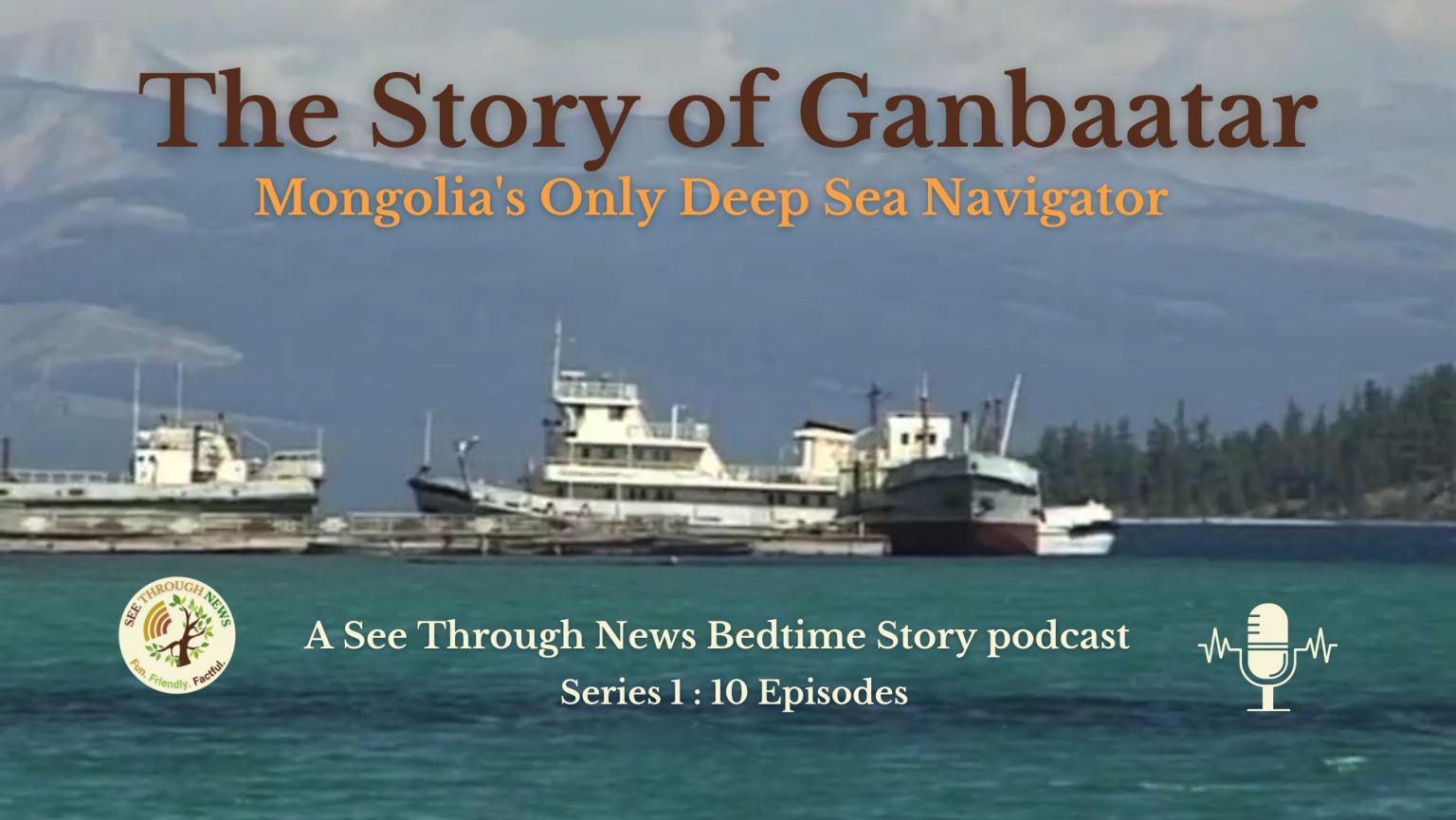Episode 8 of The Story of Ganbaatar: the only deep sea navigator in Mongolia, Series 1 of our ‘The Truth Lies in Bedtimes Stories from See Through News’ podcast
In Episode 8, we finally discover Professor Dalai’s new vision, and Ganbaatar’s unique role in it.
Music Notes: this episode’s music is a traditional song called Ulgeriin Kholboo, ‘Lacework of Fairy Tales, recorded in 1992 by the Mandukhai Ensemble.
Episode 1 – Fact, Fiction & Mongolia
Next: Episode 9, A Great Man, a Lake and a Boat
Written, Produced and Narrated by SternWriter
Audio production by Sam Wain
The Truth Lies in Bedtime Stories is a podcast from See Through News.
See Through News is a non-profit social media network with the Goal of Speeding Up Carbon Drawdown by Helping the Inactive Become Active.
See Through News is a non-profit social media network with the Goal of Speeding Up Carbon Drawdown by Helping the Inactive Become Active.
Transcript
Episode 8: Back in the Government Palace
The official vehicle of the Ministry of Agriculture had its flags on again.
The driver held the door open. The Minister respectfully gestured for Professor Dalai to get in first.
And then, just as respectfully, gestured for Ganbaatar to follow.
Once he’d seen the Minister into the limousine, the driver put the Zil into gear, and made the short journey to the Government Palace.
When the three men arrived, the chamber was once again full of Mongolia’s most powerful leaders and wisest thinkers.
The occasion this time, however, was not solemn, but celebratory.
On the dais, beside the President’s seat, were three chairs and a lectern.
The Minister, Professor Dalai and Ganbaatar sat in the three chairs. A heavy medal on a red ribbon, embossed with gold, hung around each of their necks.
Shortly after, the President stepped onstage, and up to the lectern.
When the President decided he’d had enough applause, he gestured for everyone to sit. The room fell silent.
‘My fellow Mongolians’, he intoned. ‘We mark the passage of this historic Act of Parliament, by honouring the people who made it possible.
Three days ago we passed the Act, the details of which you all, and indeed all Mongolians, are now intimate with.
An hour ago, it was my privilege to bestow the Order of Chinggis Khan on the three patriots to my left for their extraordinary efforts in compiling the Bill, and bringing it before us to approve.
What they have achieved will open a new door for our nation, permitting us once again to return to our historic role of roaming free across the globe.
This time, we come not to conquer, but to trade. And this time, we come not on horses, but on ships.
I call on Professor Dalai, now recipient of the Order of Chinggis Khan, to deliver a few words’.
The professor rose, placed his white beret on his chair, and took the President’s place at the lectern.
‘My fellow Mongolians’, he said’. ‘Thanks to your passage of our Maritime Law Bill, we now have a path ahead to rejoin the rest of the world. Should we follow s this path, our unhappy period of landlocked isolation is over’.
From his breast pocket, the professor removed, and unfolded, a creased newspaper article, in a strange script, in a foreign tongue, encircled in red pen.
‘This document, which will now reside in our national archive, marked the start of this journey, but only because it joined a path already taken by my fellow-recipient of the Order, Ganbaatar’.
The chamber burst into applause. Ganbaatar melted into his chair, overcome with pride and embarrassment.
‘Three years ago, this article, from the Communications Department of The United Nations, arrived at my office at the university.
It announced the unanimous ratification of The International Law of the Sea. The Law, approved by all nations on earth, grants every sovereign state the right to exploit the sea, and to have access to the sea – whether or not it has a sea border.
You now all know its implications. The Law means landlocked nations like ours enjoy the same rights as any state with a sea border. We may be unfamiliar with terms like sovereign, extraterritorial and plenipotentiary, but it means that we’re a train or road link away from access to a port in any neighbouring country. In so doing, we can shake free from our neighbours’ suffocating embrace.
We can freely exchange our goods around the world, without the intervention of foreign powers.
We can register foreign ships.
We can qualify for valuable fishing quotas, which we can sell for a handsome profit. Who knows, one day we may even have our own deep-sea fishing fleet!
The room erupted with applause and cheering. Professor Dalai beamed as he rode the wave. As it subsided, he continued.
‘But in order to access all these riches’, he said, ‘we needed to pass a National Maritime Law. For Mongolia, this was far from simple. To write a Maritime Law, we needed to know things no Mongolian knows.’
Professor Dalai looked over at Ganbaatar, and held his arm towards him.
‘We needed to know The Law of the Sea, naval architecture, ship safety and maintenance, sonar, maritime cartography, tide charts, fishing quotas. We were blessed that our nation had one citizen who possessed not just these secrets, but who had also tasted salt in the air, seen fish bigger than a house, and ‘ – he paused, and exchanged a smile with Ganbaatar – ‘knew how to sing sea shanties’.
In Episode 9, A Great Man, a Lake and a Boat, we attend Ganbaatar’s homecoming, and discover how you came to hear this barely credible, but largely true, story.

